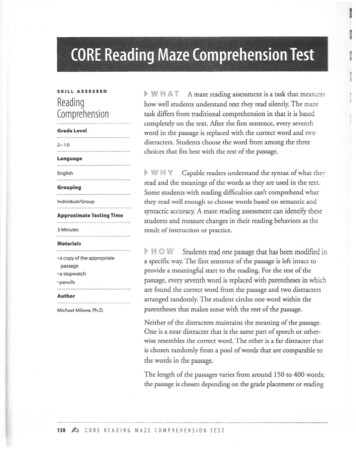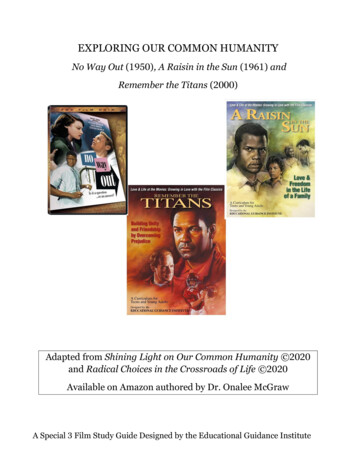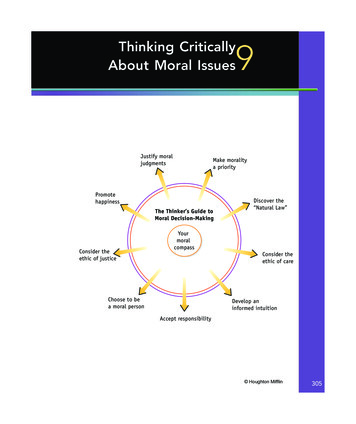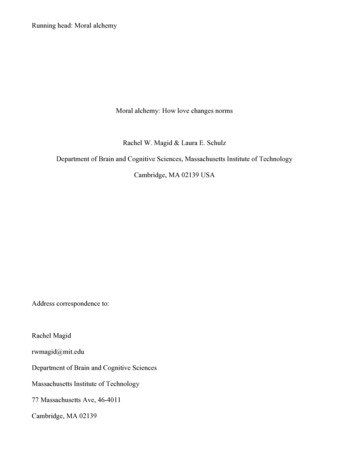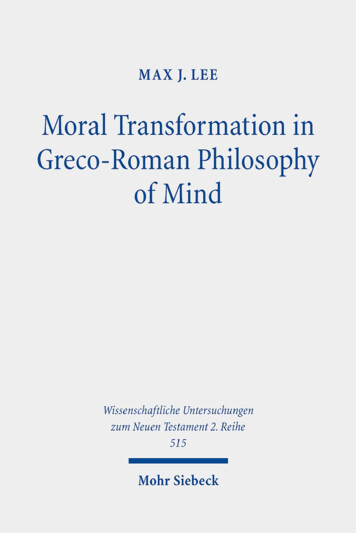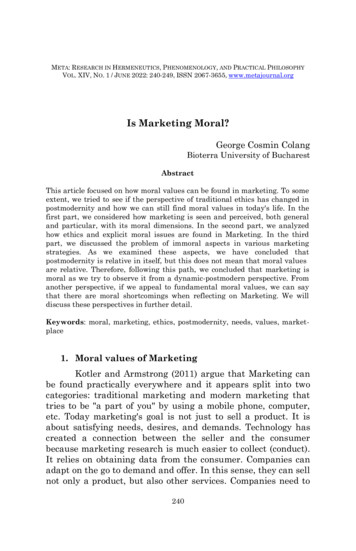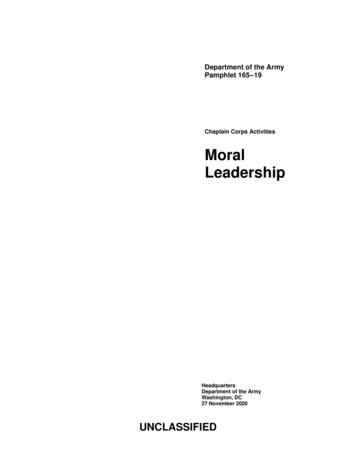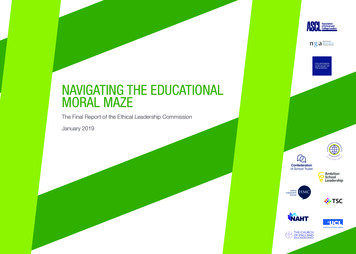
Transcription
NAVIGATING THE EDUCATIONALMORAL MAZEThe Final Report of the Ethical Leadership CommissionJanuary 2019
CONTENTSForeword3Introduction4Commission members5Abbreviations6Chapter 1 The Ethical Leadership Commission7The Framework for Ethical Leadership in Education10Chapter 2 The Pathfinder Project12Chapter 3 Professional Development and Professional Behaviour16Chapter 4 The Ethics Forum20A Constitution for the Ethics Forum23Afterword25Appendix Whose Wisdom?262 Navigating the Educational Moral Maze
FOREWORD FROM DR JANE MARTIN, CBEThe Committee on Standards in Public Life is pleased to support the work of the Ethical Leadership Commission andendorse this final report setting out a Framework for Ethical Leadership in Education (Framework).As the advisory committee to the Prime Minister on public standards, our work promotes the Seven Principles of PublicLife on which the Framework is based. As the Committee’s representative on the Commission, it was encouraging to seethe obvious passion to set a clear example to school and college leaders and offer guidance to help address the ethicalchallenges which are part of their role.The Seven Principles of Public Life apply to everyone who works in public office and we very much welcome the approachof the Commission to adapt them for educational leadership and propose personal characteristics or virtues expected ofleaders.Dr Jane Martin CBEIndependent memberThe Committee on Standards in Public Life““Because – to sum all reasons in one – it is for the common good of all.Fourteen Reasons for Supporting Women’s Suffrage, 1913Navigating the Educational Moral Maze 3
INTRODUCTIONI am delighted to present this report into the work of the Ethical Leadership Commission. The Commission was set upin 2017 to help school and college leaders consider the ethical foundation of their work, and to offer guidance for ourcolleagues at a time of great change and unprecedented pressure in education.The Commission has met nine times in 16 months with much work in between. This report covers our work and ourproposed legacy.In our work we have sought to lay the foundations for future thought and action which will help school and college leaders inall settings tackle the twin challenges of our calling:ll How well do we fulfil our roles as trusted educators?ll What kind of role models are we for the children in our care?I am extremely grateful to all the Commissioners. Their insight, commitment and experience made our time together fruitfuland enjoyable. We hope that the groundwork we have laid will help us all set a good example to all children and, with them,strengthen our society for the future.Carolyn RobertsChairEthical Leadership Commission4 Navigating the Educational Moral Maze
COMMISSION MEMBERSMartyn Beer, Deputy Head, Bootham School, York, and ASCL Council memberLeora Cruddas, Chief Executive, Confederation of School Trusts (CST)Professor Becky Francis, Director of University College of London Institute of EducationThe Rev Nigel Genders, Chief Education Officer of the Church of EnglandDr Peter Kent, International Confederation of PrincipalsEmma Knights, Chief Executive, National Governance Association (NGA)Anne Lyons, President of the National Association of Head Teachers (NAHT)Julie McCulloch, Director of Policy, Association of School and College Leaders (ASCL)Dr Jane Martin CBE, Committee on Standards in Public LifeValentine Mulholland, Head of Policy, NAHTStephen Munday, Teaching Schools CouncilDame Alison Peacock, Chief Executive, Chartered College of TeachingDr William Richardson, General Secretary, Headmasters’ and Headmistresses’ Conference (HMC)Carolyn Roberts (chair), former ASCL Honorary Secretary and Headteacher, Thomas Tallis School, GreenwichAmanda Spielman, HM Chief Inspector, OfstedRoger Steare, Corporate Philosopher in Residence at the Cass Business SchoolJames Toop, Chief Executive, Ambition School LeadershipMalcolm Trobe CBE, independent education specialist, NPQEL Programme Director for ASCLNavigating the Educational Moral Maze 5
ABBREVIATIONSThroughout this document:llllllllllboard means the accountable body for the school or group.ELC refers to the Ethical Leadership Commission.Framework refers to the Framework for Ethical Leadership in Education.Head refers to the most senior executive post holder in the organisation: CEO, Headteacher, Principal.leaders refers to professional educators and voluntary governors or trustees.6 Navigating the Educational Moral Maze
CHAPTER 1 THE ETHICAL LEADERSHIP COMMISSION (ELC)Why is ethical leadership important?1.School and college leaders face ethical dilemmas every day but have never had an agreed Framework that enables us toexplore and test these dilemmas against ethical principles.2.Members of the Association of School and College Leaders (ASCL) expressed concern that there was little specificallyabout ethics in the discourse on education leadership. They felt this lack was particularly noteworthy in a schoolleadership climate where structures are diverse, accountability measures and their consequences are severe, and inwhich decisions are often taken under great pressure with competing demands in play. They felt that a clear set ofprinciples, owned by the profession, was needed to help everyone navigate the educational moral maze.3.In April 2017, ASCL called together an independent commission of opinion-formers from across education, representingthe following influential bodies:llllllllllllllllllllllllllAmbition School LeadershipAssociation of School and College LeadersChartered College of TeachingChurch of England’s Education DepartmentCommittee on Standards in Public LifeConfederation of School TrustsHeadmasters’ and Headmistresses’ ConferenceInternational Confederation of PrincipalsNational Association of Head TeachersNational Governance AssociationOffice for Standards in EducationTeaching Schools CouncilUniversity College London Institute of EducationNavigating the Educational Moral Maze 7
The ELC met nine times between June 2017 and September 2018.4.5.The Commission was formed around the following terms of reference:a.The ELC is an independent commission of nonpartisan experts formed to analyse an important public issue. Ourvalue comes from our ability to use our expertise to consider topics and issue findings or recommendations whichcan then be used by those with decision-making powers to act.b.Ethical leadership is leadership that is directed by ethical beliefs and values. It embraces the Seven Principles forPublic Life: selflessness, integrity, objectivity, accountability, openness, honesty and leadership. In education there isnow a need to re-examine ethical leadership.c.In a school-led, self-improving system, it is right that the profession convened and appointed such a panel. ASCLtherefore convened and appointed the ELC to consider matters of ethical leadership and public life as these relateto education leadership in the context of a highly diversified and increasingly autonomous landscape.The Commission had the following scope:a.Ethical leadership is firstly a matter of the values and behaviours of those appointed to hold positions in publiclife and lead our educational organisations. It is therefore intrinsic to leadership standards, development, andqualifications. It is also clearly a matter for governing boards in the appointments they make, the monitoring theyundertake, and for the regulation and inspection of the system.b.We expect that the ELC may develop ethical principles for education.c.We hope that such ethical guidance might support aspiring school and college leaders and give them confidence totake up leadership positions in our schools and colleges.8 Navigating the Educational Moral Maze
d.We also expect that the ELC may make recommendations that relate to:i.ii.iii.iv.v.6.leadership standardsleadership development and qualificationsleadership appointmentsregulationinspectionAs its work progressed, the ELC adopted, adapted and devised a set of words to enable and encourage ethical thinking.We call these words our Framework for Ethical Leadership in Education (Framework), and propose that the Frameworkshould be used in three ways:a.As a set of words, concerning values and virtues, which are recognised in educational discourse. These words actas a counterpoint to the language about measurement of schools and colleges and pupils that is commonly used.They are designed to make us stop and think.b.In training and reflection for leaders, teachers, governors, trustees and anyone concerned with how we educatethe nation’s young people. This will take place for governors and trustees through the Pathfinder Project, outlined inChapter 2, and the development of explicitly ethical reflection in teacher and leadership training and development.c.In the establishment of an Ethics Forum at the Chartered College of Teaching (outlined in Chapter 4). This will keeplanguage and discussion about ethics live, grounded and relevant.Navigating the Educational Moral Maze 9
THE FRAMEWORK FOR ETHICAL LEADERSHIP IN EDUCATIONSelflessness School and college leaders should act solely in the interest of children and young people.Integrity School and college leaders must avoid placing themselves under any obligation to people or organisations thatmight try inappropriately to influence them in their work. Before acting and taking decisions, they must declare and resolveopenly any perceived conflict of interest and relationships.Objectivity School and college leaders must act and take decisions impartially and fairly, using the best evidence andwithout discrimination or bias. Leaders should be dispassionate, exercising judgement and analysis for the good of childrenand young people.Accountability School and college leaders are accountable to the public for their decisions and actions and must submitthemselves to the scrutiny necessary to ensure this.Openness School and college leaders should expect to act and take decisions in an open and transparent manner.Information should not be withheld from scrutiny unless there are clear and lawful reasons for so doing.Honesty School and college leaders should be truthful.Leadership School and college leaders should exhibit these principles in their own behaviour. They should actively promoteand robustly support the principles, and be willing to challenge poor behaviour wherever it occurs. Leaders include boththose who are paid to lead schools and colleges and those who volunteer to govern them.10 Navigating the Educational Moral Maze
Schools and colleges serve children and young people and help them grow into fulfilled and valued citizens. As role modelsfor the young, how we behave as leaders is as important as what we do. Leaders should show Leadership through thefollowing personal characteristics or virtues:Trust leaders are trustworthy and reliableWe hold trust on behalf of children and should be beyond reproach. We are honest about our motivations.Wisdom leaders use experience, knowledge and insightWe demonstrate moderation and self-awareness. We act calmly and rationally. We serve our schools and colleges withpropriety and good sense.Kindness leaders demonstrate respect, generosity of spirit, understanding and good temperWe give difficult messages humanely where conflict is unavoidable.Justice leaders are fair and work for the good of all childrenWe seek to enable all young people to lead useful, happy and fulfilling lives.Service leaders are conscientious and dutifulWe demonstrate humility and self-control, supporting the structures, conventions and rules which safeguard quality. Ouractions protect high-quality education.Courage leaders work courageously in the best interests of children and young peopleWe protect their safety and their right to a broad, effective and creative education. We hold one another to accountcourageously.Optimism leaders are positive and encouragingDespite difficulties and pressures, we are developing excellent education to change the world for the better.Navigating the Educational Moral Maze 11
CHAPTER 2 THE PATHFINDER PROJECTEmbedding the Framework in leadership practice for governors, trustees and professionals7.The second part of embedding and sustaining our Framework will be achieved by school and college leaders, governors,trustees and senior leaders, taking part in the Ethical Leadership in Education Pathfinder Project (Pathfinder Project). Thiswill be run through the National Governance Association.8.The Pathfinder Project asks leaders to commit to our Framework and look closely at our two fundamental questions:ll How well do we fulfil our roles as trusted educators?ll What kind of role models are we to the children in our care?The Pathfinder Project provides training materials to help guide boards and leadership teams. The first set of thesematerials will be launched as this report is published.9.Schools, colleges, and other organisations may become Pathfinders through the NGA, CCT and ASCL websites.Pathfinder schools and colleges will automatically be able to take part in the Ethics Forum’s processes.How can this help trusts and governing boards?10. All boards have three core functions as set out in the Department for Education’s Governance Handbook of January2017.ll Ensuring clarity of vision, ethos, and strategic direction.ll Holding executive leaders to account for the educational performance of the organisation and its pupils, and theperformance management of staff.ll Overseeing the financial performance of the organisation and making sure its money is well spent.12 Navigating the Educational Moral Maze
11. That same document requires six “key features of effective governance”:i.ii.iii.iv.v.vi.Strategic leadership (vision, ethos, strategy)Accountability (standards and financial performance)People (skills, experience, qualities, capacity)Structures (defined roles and responsibilities)Compliance (statutory and contractual requirements)Evaluation (quality and impact of governance)The document discusses strategic leadership in terms of “culture, values and ethos” so there are recommendationsabout what kind of people should serve on boards. This is described in terms of the skills or experience that governorsbring and how they can build up the character of the school or trust. It notes that governors are people who have theability to preserve and develop the character of the organisation. It assumes that the character of the organisation isa good one.12. Where a school has a religious foundation, the values and virtues of a governor may be assessed by his or heradherence to the faith in question. Where the school or trust is secular, the ability of a governor or trustee to preserveand develop the character of the organisation is perhaps harder to assess. Governors’ commitment to fundamentalBritish values of democracy, the rule of law, individual liberty, and mutual respect and tolerance for those of differentfaiths and beliefs is required. Further, governors should want to encourage students to respect other people withparticular regard to the protected characteristics set out in the Equality Act 2010. They should assess the risks attachedto safeguard and promote students’ welfare.In all of that, ethical behaviour and practice is assumed but not explained.Navigating the Educational Moral Maze 13
Creating an ethical climate13. Leaders have complex, endless tasks to achieve and complete daily, termly, annually, by cohort and for policymakersand regulators. It is easy to lose sight of the wider context for our work, and easy to answer our first question “how wellam I doing as a trusted educator?” purely by quoting the metrics of accountability. The second question: “what kindof role models are we?” should be even more important. If our schools and colleges have successful outcomes, theyshould be achieved by leaders leading thoughtfully and ethically. In that way we set a good example in our communitiesand to our children, to such an extent that the nation would be in good shape if all children did as we do. Achieving goodoutcomes should be a result of doing a good job, not a proxy for it.14. The training programme offers two ways for boards to think about the embedded values and virtues in their work. Thereis an audit tool or a series of activities. Both are designed to enable a school to say: “We think about ethical behaviourcarefully here.” Our ethical weathervane is designed to give busy, devoted and distracted leaders the chance to look atwhat underpins the decisions we make. We hope it is thought-provoking and useful. We hope that it will help make ourschools places where the next generation of ethical leaders may grow.Pathfinder Project15. The programmes for governors and leaders are in several forms, to help embed explicitly ethical thinking in school andcollege leadership. They all cover the following aspects:llllllllllllllUsing the language of values and virtues in the FrameworkBuilding values and virtues into leadership working practicesSafeguarding values and virtuesLeadership and management stylesEnvisaging a model community (with children, staff, parents)Articulating and monitoring ethical educationCollaborating with the Ethics Forum14 Navigating the Educational Moral Maze
Is it a Charter Mark?16. We want to help leaders set themselves the challenge of weaving ethical considerations into all activities. We would notpresume to authorise or prohibit any behaviour, but aim to change the way that we think about the purpose and processof the education we offer. We do not, therefore, offer a badge which says that a school or trust is kite-marked as ethical.Any school or trust which uses the materials will devise a form of words for themselves which will tell any visitor to awebsite:“Our school/ trust seeks to uphold the values and virtues of ethical education [insert own statement at the end of theethical audit]. We try to use the Ethical Leadership Framework in everything we do.”Adopting the Framework in organisations17. It may be that other education institutions who are not schools or colleges also formally align themselves. This could takethe form of a statement of ethical leadership principles for adoption and constant discussion, not as a code of conduct,checklist or key performance indicators. Institutions will develop their own practice on this.18. We hope that the Framework might also give colleagues confidence in calling out unethical behaviour and assist theadvice and support structures of professional associations in the guidance that they give to members who face suchdilemmas.19. The International Confederation of Principals (representing school leaders from across the world) has aligned itself withthe work of the ELC and has committed itself to promoting the Framework to its members.Navigating the Educational Moral Maze 15
CHAPTER 3 PROFESSIONAL DEVELOPMENT AND PROFESSIONAL BEHAVIOURThe Framework and teacher training and development20. Ethical practice should be embedded at the point of entry to teaching. However, current models of initial teacher trainingprioritise subject knowledge and classroom practice. While this is necessary it is not sufficient for the development ofteachers.21. As discussed above, schools and colleges are where society looks after its young people, so teachers at all levels havetwo important roles. They must act as diligent trusted educators, and they must be good role models. The Teachers’Standards 2012 and Headteachers’ Standards 2015 give a clear overview of postholders’ responsibilities, and the valuesand virtues of the Framework are discussed above.22. The Commission sees several potential benefits in embedding the ethical behaviour required by the Framework inteacher development. Stand-alone courses in ethical behaviour may be neither attractive nor effective, risking the tickbox, KPI approach which has beset our system in recent years. If ethical behaviour is important then the language ofethical thought and reflection needs to be normalised within training programmes and expected of all serving and leadingpractitioners.Embedding the Framework23. In early career development:ll The Framework will reflect the serious ethical vocational choice made by young people when they choose and enterteaching as a career.ll Teachers and school and college leaders have to be model professionals and good role models to the young. Theytherefore need training that enables them to develop and apply this self-understanding from the start of their careers.16 Navigating the Educational Moral Maze
ll It may help teacher recruitment if deep thought and personal commitment about virtues and values is explored,explained and encouraged. Teaching may appeal more as a serious vocational option than its current image asdifficult and unmanageable in the early years and suited only for superheroes at leadership level. It will help their selfunderstanding if teachers are introduced to the Framework early.ll Teachers may be better equipped to analyse and understand why schools make the decisions they do if they areintroduced to a set of underpinning principles.ll It may encourage more teachers to aspire to senior roles, reassured that instant certainty is less important than anability to tackle difficult issues thoughtfully and to act correctly. This might keep them in the profession longer.ll It should encourage teachers to challenge short-cuts and poor practice.24. In leadership development:ll Aspiring leaders should understand the usefulness of the Framework in their training and be given opportunities toapply it to real-life case studies.ll The Framework may help to emphasise the value of seeing many sides to an issue, of reflecting calmly, and actingrationally and courageously. Keeping calm is perhaps the most recognisable fundamental British value.ll A focus on thoughtful and reflective decision-making might also help address the current gender imbalance insecondary school leadership. There is some evidence that women are deterred from senior roles through anunwillingness to cast themselves as super-certain instant decision makers.ll Serving leaders should be reminded of the Framework in leadership discussion and debate, and encouraged to useit in their work.ll The National Professional Qualification for Headship and the National Professional Qualification for ExecutiveLeadership should include an opportunity for candidates to demonstrate that they are able to reflect on abstractconcepts and make independent decisions based on good practice, rather than learning ‘right’ answers or waitingto be told what to do by a regulator.Navigating the Educational Moral Maze 17
25. Ethically-aware training programmes should include:i.ii.iii.iv.v.A consideration of the purpose of education and the school’s role in developing virtuous behaviour in society.An introduction to the Framework and an expectation that trainees will identify its values and virtues.The application of the Framework to specific areas of school life, enabling trainees to answer for themselves thequestion: “What should I do? What is the right action?”Reflection on the role of the professional in loco parentis. Is the language of values and virtues helpful?Longer, reflective responses to real dilemmas of school or leadership experience, such as:a.b.live case studies from school experience as supplied by the Ethics Forum on matters such as curriculum,budget management, class organisation, behaviour management and exclusion, admissions, managing staff,leadership styles.dilemmas devised by the training provider, such as:ll How does your school balance the right of the child to a good education and the accountability imperativesof the school?ll Use the Framework to explore the dilemmas schools and colleges face when designing a curriculum.ll When permanent exclusion has such a lasting impact on a child, how might it be a necessary act for aschool or college? Use the Framework to explore the dilemmas organisations face when dealing with themost challenging behaviour.ll How might ethical behaviour be embedded in all areas of your work? Reflect on the needs of your school,college or trust by using your development plan or other central planning documents.Such reflection could be assessed, for example, by a written submission and discussion, demonstrating anunderstanding that developing a frame of reference for decision-making is necessary to successful leadership.18 Navigating the Educational Moral Maze
26. If the Framework is adopted within the wider education system, formal training programmes could be developed wheredesired or required. We will seek to:a. begin this by embedding the Framework in the Chartered Teacher and proposed Chartered Leader programmes ofthe CCTb.make proposals to government about the inclusion of ethics in teacher and leadership training and the NPQs.This should be led and moderated by a successor body to the ELC, the Ethics Forum.Navigating the Educational Moral Maze 19
CHAPTER 4 THE ETHICS FORUM27. As discussed previously, the ELC identified three desirable outcomes from its work:i.ii.iiiTo promote the language of the Framework in school leadership discourse and action.To embed the Framework in initial teacher training and subsequent professional development.To establish a Forum where ethical issues may be openly debated.In order for (ii) and (iii) to be fulfilled, there needs to be a home for the ELC’s legacy which will provide a practical way ofenabling and sustaining ethical debate.An Ethics Forum at the Chartered College of Teaching (CCT)28. This will best be realised by the establishment of a standing body to discuss ethical educational leadership issues. Thisis not a proposal for a regulatory body, but for a group which can consider emerging system-wide issues and adviseteachers and leaders through discussion and debate.29. For example, it would be beneficial to the stability of our system and the service we offer children and young people, theirparents and communities, if such a body were able to examine policy changes for ethical implications as they arise, andadvise decision-makers accordingly. Accountability has become almost synonymous with ‘perverse incentives’: our workcould operate as a valuable sounding board for government to mitigate against the unintended consequences of policyproposals.20 Navigating the Educational Moral Maze
30. The ELC spent some time considering the correct location for such a body. The CCT has a Leadership DevelopmentGroup (LDAG) whose remit has eight strands. It will:1.develop and promote leadership pathways and standards2.advise and oversee the development and accreditation of leadership programmes and qualifications (Note: wewould envisage this in the future to include the national professional qualifications for leadership)3.host a constructive dialogue between education leaders and policy makers, creating a strong sense of sharedendeavour and vision regarding school and college leadership development4.provide guidance on school and college leadership standards, including ethical practice5.advise and oversee the development of the CCT Fellowship6. identify and disseminate evidence about effective leadership, in particular relating to addressing educationalinequality7.8.promote leadership succession planning and equality and diversity in leadership roleswork on determining areas for research into school leadership and advise the Department for Education and otherrelevant bodies on areas of educational leadership that require researchNavigating the Educational Moral Maze 21
31. The achievement of most of these aims would be assisted by the establishment of an Ethics Forum. It could fulfil severalimportant tasks:ll As a forum where dilemmas in school leadership are discussed and profession-led guidance is developed throughregular seminars and conferences.ll As a forum where policy or regulatory proposals could be examined to guard against the creation of perverseincentives.ll Developing ethics-related materials for the national professional qualifications for leadership.ll Providing regular articles arising from ethical discussion in publications for the CCT and other organisations.The Forum’s work and development could be monitored through the internal structures of the CCT and reportingmechanisms to its members.32. Further, as the CCT develops the prestigious Chartered Teacher designation, one of its distinguishing features could be aformal consideration of ethics. The Ethics Forum could offer input to this qualification.33. As a place where ethical challenge and practice is actively encouraged and explored in safety, the Forum’s discussionsand potential publications could help support leaders in schools to be more confident about reflective and nuanceddecision-making.34. The Ethics Forum therefore is not just the legacy body of the ELC but a central part of the professional service the CCToffers its members.22 Navigating the Educational Moral Maze
A Constitution for the Ethics ForumThe purpose of the Ethics Forum (Forum) is to promote, uphold, develop and support ethical leadership and its discussion byschool leaders so that they fulfil society’s expectations of their roles, and set a good example to young people.ll The Forum will hold at least three open meetings each year, one of which will be an Annual Summit.ll The Forum’s business will be managed by two meetings each year of its steering group.ll Meetings will generally be held in London, at venues offered by sponsoring organisations.ll The Forum’s steering group will comprise:a.b.c.d.Representatives from at least three of the organisations represented on the ELCtwo school leaders engaged in the Pathfinder programmetwo places available for other education organisations which choose to align thems
6 Navigating the Educational Moral Maze ABBREVIATIONS Throughout this document: llboard means the accountable body for the school or group. llELC refers to the Ethical Leadership Commission. llFramework refers to the Framework for Ethical Leadership in Education. llHead refers to the most senior executive post holder in the organisation: CEO, Headteacher, Principal.



